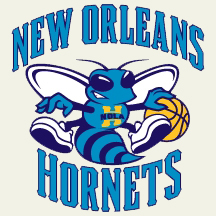Graduate earns place in professional athletic training
On the home page:
Click on the thumbnail to enlarge.
Southeastern graduate Mark Armour II works with one of the players on the New Orleans
Hornets NBA basketball team.
Mark Armour II, Assistant Athletic Trainer, New Orleans Hornets
Joshua Yellen, Interim Director, Athletic Training Education Program
When Southeastern graduate Mark Armour II was looking at athletic training programs
as a pre-med student at Clark Atlanta University, he spoke with several representatives
of the Southeastern program to set up a visit.
 "After the visit to Southeastern, I knew it was the place for me,” said Armour, now
the assistant athletic trainer with the NBA New Orleans Hornets. “The Athletic Training
Education Program (ATEP) had a good reputation, structure, a great passing rate on
the Board of Certification (BOC) test, and seemed like a strong learning environment.”
"After the visit to Southeastern, I knew it was the place for me,” said Armour, now
the assistant athletic trainer with the NBA New Orleans Hornets. “The Athletic Training
Education Program (ATEP) had a good reputation, structure, a great passing rate on
the Board of Certification (BOC) test, and seemed like a strong learning environment.”
While a student at Southeastern, Armour served as an intern for two years, under the
direction of Southeastern alumnus Reggie Stone, with the New Orleans VooDoo arena
football team. Armour said it was the gateway for him into professional sports.
“I had the opportunity to work with professional athletes and learn the ropes of practicing
athletic training in the pro-sport setting early on,” he said. “I had a great mentor
in Reggie, learning from his athletic training skill and professionalism. He also
helped me attain my first job in the NFL with the New Orleans Saints.”
Armour said nothing can compare to being a part of the Saints during the Superbowl
season, which he said was hard work. In that experience, he said he gained more knowledge
about athletic training in professional sports and learned more about the business
of professional sports as a whole.
“I have had the opportunity to work on and with some of the best athletes in both
the NFL with the Saints and the NBA with the Hornets, as well as top coaches, physicians,
athletic trainers and support staff from around the world,” he said. “With all the
latest and greatest technologies and equipment at my disposal, it gives me the opportunity
to expand my knowledge base in my practice and forces me to stay on top of what is
new and improving in sports medicine.”
Joshua Yellen, instructor and interim director of the athletic training education
program, said he knew when he met Armour that he was a good candidate for the growing
field of athletic training.
“Mark always had a smile on his face, had a great attitude and worked hard,” Yellen
recalled. “During his interview into the program, he was definitely memorable. It
was a pleasure to watch him grow and mature in our program, and it has been fun to
see him take his skills and education and create his own path and journey.”
A 2007 Southeastern graduate of the program, Armour credits Southeastern with preparing
him to enter the real world as an athletic trainer.
“Southeastern allowed me to be an independent thinker. The athletic training program
put me in a work environment very similar to those in ‘real world’ athletic training,”
he said. “The coursework gave me focused information that was pertinent in what I
do as a professional athletic trainer, yet allowed me to think outside of the box
and teach myself to continue learning.”
Armour said he would recommend Southeastern to perspective students because the Southeastern
community embraces students as individuals and provides them with the keys to be successful
and still enjoy the whole college experience.
“Southeastern gave me and many of my friends the opportunity to be successful, as
well as provided many avenues to get help to succeed, whether it was helpful faculty
or another service, a lab, or program that the university provided,” he said. “I am
proud to have been part of such a successful program.”
According to Yellen, athletic training is a growing field in healthcare. The U.S.
Department of Labor has predicted that athletic training will grow 37 percent faster
than all other professions until 2018, because of the athletic trainer’s abilities
to prevent injuries and reduce healthcare costs.
“Because of the unique expertise of the athletic trainer, possible places of employment
include professional and collegiate teams, secondary and intermediate schools, sports
medicine, hospital and rehabilitation clinics, occupational settings, fitness centers,
and physician offices.
Southeastern recently dedicated a 35,000 square foot, two story addition to the Kinesiology
and Health Studies Building. The addition houses labs used by the Athletic Training
Education, providing modern labs that Yellen said represent a big boost to the program.

